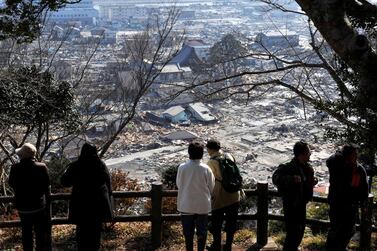Japan’s Tepco said its board will decide to permanently shut a nuclear power plant near its wrecked Fukushima Dai-Ichi station amid regional opposition to its use following the 2011 disaster.
The utility, officially known as Tokyo Electric Power Co, told Fukushima governor Masao Uchibori that it will decommission the four reactors at the Fukushima Dai-Ni facility, which survived damage sustained from the 2011 tsunami and earthquake. The board will meet to officially decide to scrap the units, the company said Wednesday without providing a date of the meeting.
It will cost ¥280 billion (Dh9.54bn) to decommission the facility and the board is scheduled to meet later this month, Kyodo reported. The process will take about 30 years, the company said.
While Tepco left open the option of an eventual restart of Fukushima Dai-Ni, which is about 11 kilometres south of the wrecked Dai-Ichi plant, its return to commercial operations always seemed arduous considering local opposition and the site’s association with the disaster. Shutting the four units will reduce Japan’s fleet of operable reactors to 33, compared to 54 before the triple meltdown at Fukushima Dai-Ichi.
Prime Minister Shinzo Abe’s Liberal Democratic Party has advocated for resuming the nation’s nuclear reactors, which were eventually shuttered following the Fukushima disaster. Just nine of the country’s operable reactors have restarted under post-Fukushima safety rules due to widespread public opposition and stricter safety regulations.
Dai-Ni’s decommissioning places more pressure on Tepco’s plan to restart two reactors at its Kashiwazaki-Kariwa plant about 215 kilometres west in the Niigata prefecture in a bid to boost profitability. Tepco hasn’t officially applied to restart the remaining five reactors at the facility amid calls for some of the units to be decommissioned.
Tepco said in June of last year it was considering permanently shutting the four units at the Fukushima Dai-Ni facility after Mr Uchibori requested the move.







